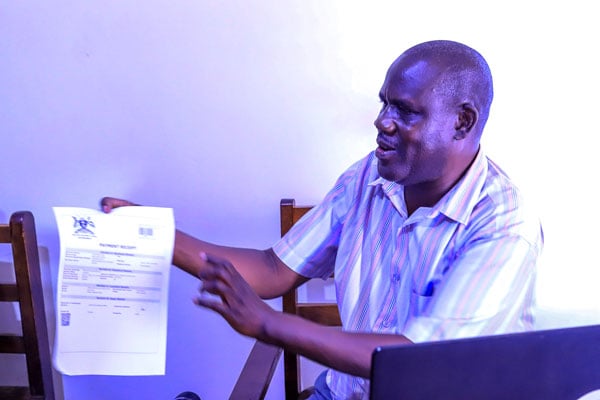Prime
Pallisa rolls out digital tax collection system to boost revenue

The senior Finance Manager, Pallisa District, Mr Joseph Akol addressing Journalists about the new digital tax revenue collection system at his office. Photo/ Dorothy Nagitta
What you need to know:
- IRAS was developed in 2019 by the European Union with support from the World Bank purposely to cover all local government revenue sources.
- It was first piloted in Nansana, fort portal and Gulu city.
Pallisa District local government has resorted to digital ways of collecting revenue in order to boost collection.
The Integrated Revenue Administration System (IRAS)”, an online Platform that enables local government and cities to collect revenue has not only simplified the work but it has also helped to reduce corruption related cases at the district.
Under the system, there is automation of key processes such as registration of the details of the taxpayer, assessment, billing among others.
Mr Robert Mukesi, a district planner said the digital system has helped in addressing leakages which were unveiled in the previous manual system.
“There were leakages for example on trade licenses. They would pick money for a trade license and you would never know but now it is a one stop center system that everybody must go through,” Mr Mukesi said in an interview with this publication.
Mr Mukesi also said that the ideation of the system was done by Action Aid international through their district meeting.
“I picked interest in the idea because other districts which had adopted the same were doing well in terms of revenue collection and later on I sold the idea to the technical planning committee in consultation with my CAO. Being that we already showed interest, when requested for it from the ministry of local government, it was cleared in less than two weeks,” he added.
He said the district projects about Shs750 million in revenue this financial year.
“We shall reach this projection because all sorts of revenue are now captured in the system,” he argued.
Mr Fredrick Byekwaso, the Chief Administrative Officer (CAO), also appreciated the system to be user-friendly and it has helped to solve the problem of misappropriation of taxpayer’s money.
“It was hard for a parish chief to collect revenue from the field when at home he has financial needs but has no other kind of money with him. This has been affecting our accounting process to the extent many chiefs have been using this money promising to pay back after getting their salaries which at times they don’t fulfill.”
In addition, Mr Joseph Akol, the senior finance manager, Pallisa District, said since the establishment of the system in April 2023, more revenue has been collected compared to the years before.
“We have gone up to Shs45 million in collections now but of course it is a collection at a pool. We still need support in terms of sensitizing the public. It is very difficult to talk to people about this system,” he said.
Although the system has helped in reducing cases of indiscipline among Civil servants such as misappropriation of funds and among other issues, Mr Akol said they are still grappling with some challenges such as network.
“There are many issues with this system since it is a web based issue. Sometimes the network disappears. Someone is holding the money he wants to pay, but you have to request him to wait and you can’t tell someone to leave the money with you because it is not allowed,” Mr Akol said.
He added, “We started using the system in April but can you imagine, it has already been upgraded. We were still getting used to the other one (first version) but now it’s in the third version. Sometimes I don’t know what IT people do, they don’t give us time to internalize things.”


